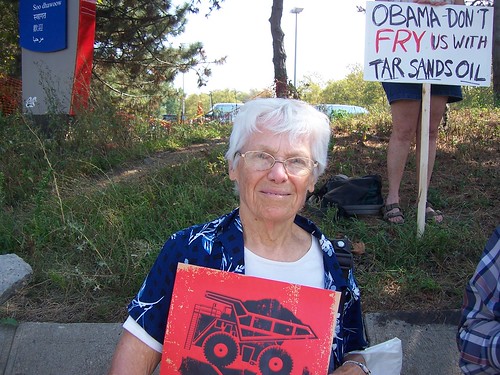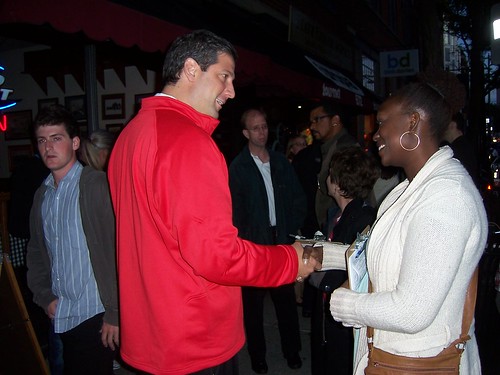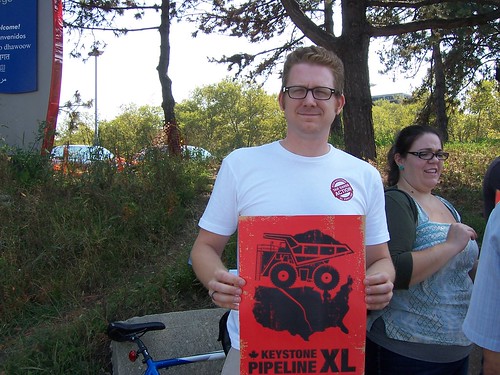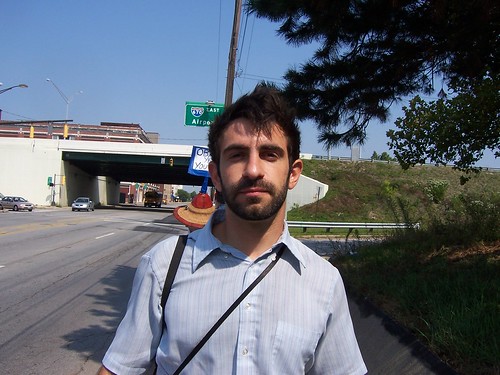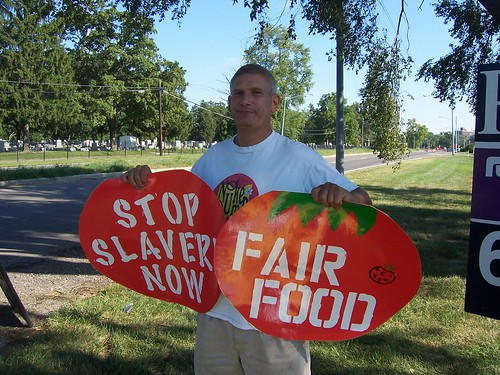WCRS Podcast - What You Care About
You've convinced me... Now go out and make me do it.
4:55 minutes (4.51 MB)
The quote is apocryphal, but Ellen Baumgartner is a local activist who is holding on to the "make-me-do-it" method for getting Obama to deliver at least some of the changes he promised during his campaign in '08. A couple of weeks after being jailed for civil disobedience in protest against the Keystone XL tars sands pipeline, Baumgartner said she supports Obama's reelection.
"I believe in Obama. I think he has had tremendous challenges. But he has done a number of good things. People are expecting too much of him, because he has inherited a mess. Now, with the Congress being so antagonistic and determined to not give him anything that he wants, it's very discouraging. However, if the choice is between Obama and a Republican of the ilk we have been seeing, it's Obama hands-down."
In late August police arrested more than 1200 people near the White House. Protestors took part in civil disobedience against Keystone XL. It was part of a two-week long effort to send a message to Obama and the rest of our country.
The proposed pipeline would carry tar sands oil from Canada to Texas where it would be refined and sent to other countries. The project has united many environmentalists and human rights activists who say tar sands oil extraction violates the land rights of indigenous people in Canada and exacerbates climate change.
"We should let him (Obama) know what his supporters want him to do... He has the power to say no (to Keystone XL). He doesn't need Congress to approve of his decision."
- Login to post comments
- Read more
- Download audio file
Rev. Kujenga Eliyah Ashe on building a mass movement
13:35 minutes (12.44 MB)
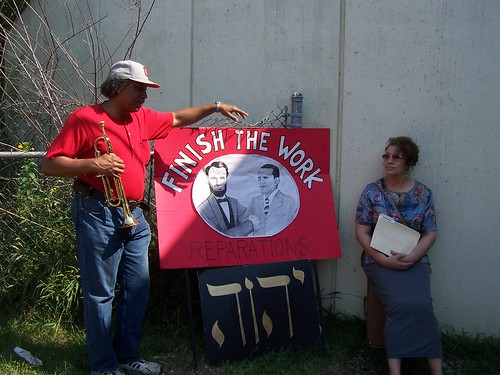
Rev. Kujenga Eliyah Ashe and K. Lanai Ashe near the Fort Hayes High School where President Obama spoke during his visit to Columbus to highlight his jobs plan
Ashe is the executive director of Community Organization for Abundant Life COAL I asked him what he thought of the environmental movement.
"The Earth is being raped by multinational corporations. They're polluting the Earth. Instead of using the solar power and wind power that they could be using...they're using fossil fuels. They're doing that because there's so much profit in it."
Ashe said he and fellow activists are pushing for an economic rights movement.
"The civil rights movement which Dr. King led has done great things. We even have a president w/ brown skin. So his dream has come true in terms of civil rights. But Dr. King, before he was killed, was starting to push for economics. He was boycotting different corporations and was planning a poor people's march on Washington, just like up in Chicago. They still have the Poor People's Campaign headed by Jerry Robinson."
Ashe said an economic rights movement lends itself to being broadly inclusive.
"The Civil Rights Movement helped all people-- black, white, red, yellow, gays, women. Everybody piggybacked on the Civil Rights Movement. Now we have our civil rights. We can vote. We have the franchise and (Black) mayors, congresspeople, senators, and even the president of the United States...Now we need our economic rights."
Ashe said the first program of that economic rights movement is repatriation and reparations for all descendants of slavery.
- Login to post comments
- Read more
- Download audio file
How can the mostly white middle class environmental movement engage w/ Black & low-income communities ?
6:57 minutes (6.36 MB)
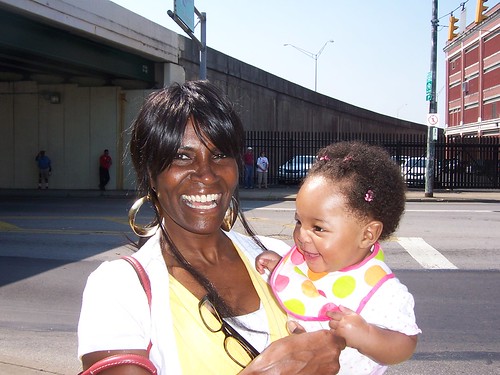
Kimberly Jackson Morris & Jamira Jamison
tomover@thecolumbusactivist.org
Morris and I spoke during President Obama's visit to Columbus on Sept 13. Most of the protestors who had been there to tell Obama to not approve the Keystone XL Pipeline project had left. Keystone XL would carry tar sands oil from Canada to Texas where it would be refined and shipped to other countries.
There were no people of color in the protest, though a Black elder sat nearby on a lawn chair so as to stay in the shade during the hot September day.
Morris said the under-representation of people of color in the environmental movement is a case in point on the importance of education.
"We're not educated on those facts...When you go into lower economic areas, there's no one standing there giving us information about a pipeline."
Morris said white middle class, environmental activists should spend time in Black and low-income parts of town.
"Go into those communities and talk to people. There are people who aren't too busy to listen. But the information isn't there. Do you go into these communities and speak w/ people about these things that you're protesting ? I'm talking about urban communities."
Morris said standing in the streets holding signs won't necessarily engage people who aren't currently involved with environmental and other causes.
- Login to post comments
- Read more
- Download audio file
Ohio Congressman Tim Ryan on taxes, fracking, and rebuilding US manufacturing.
4:42 minutes (4.3 MB)
In the photo above: Ohio Congressman Ryan and Ashley Allison a Franklin County organizer for Obama for America (OFA) talk outside the Short North Tavern on Sept 15.
Ryan was in Columbus to help fight against Ohio SB 5 and Ohio HB 194. After speaking with Ryan, I'm inspired, surprised and confused.
I'm inspired ordinary people such as myself can engage with politicians who spend much of their time in D.C. But
I'm surprised he said fracking (if done right) is a way to address Global Warming. And I'm confused by his support for a flat tax that is somehow progressive. I didn't know the two were compatible.
First, the congressman's remarks about taxes, then on to fracking and rebuilding US manufacturing.
Tom Over : What is your opinion on raising taxes on big corporations and the super wealthy. 1 percent of the US population controls 40 percent of the wealth. Meanwhile we're hearing about cuts to education and union busting affecting cops and firefighters. What's your opinion on progressive taxation ?
Congressman Ryan: I've been one of the few voices in Congress over the past couple of years making sure we do ask the top 1 percent to pay more. I don't think we have anything to be ashamed of.
If you look at the income that was controlled by the top 1 percent in the late 70s, it was about 9 percent of all the income in the country. Now the top 1 percent controls about 25 percent of real income in the country.
- Login to post comments
- Read more
- Download audio file
Andrew Sidesinger to President Obama: Stop the Keystone XL Pipeline
4:31 minutes (4.13 MB)
Andrew Sidesinger and about two dozen other activists were on Cleveland Avenue chanting and holding signs to remind President Obama he has the authority to reject the Keystone XL Pipeline plan.
Sidesinger said tar sands oil extraction violates the rights of indigenous people in Canada, and that it has an enormous amount of green house gas emissions.
"The tar sands is an incredibly dirty project. It destroys a beautiful pristine forest in Canada. It destroys, for every one gallon of gasoline made, 20 gallons of water."
As for why such an environmentally destructive plan is even being considered in the first place, Sidesinger said, "There are a lot of heavily invested oil companies and pipeline companies and people who want to make more money...Everybody drives cars and everybody wants more oil. They want cheap oil."
But this project won't lower oil or gas prices, Sidesinger said.
"Demand is skyrocketing. We need to find ways to reduce our usage, not continue these insane projects. There has to be a limit to what we as a society thinks is reasonable for ways to get our energy. We're scraping the bottom of the barrel, which you saw with BP and the Gulf of Mexico disaster. We're now in the Arctic drilling, where there are no resources to clean up a spill, and we're destroying a beautiful forest and turning it into a moonscape."
Sidesinger said there are better options for getting our energy.
- Login to post comments
- Read more
- Download audio file
Danny Berchenko to President Obama: Stop the Keystone XL Pipeline
6:04 minutes (5.56 MB)
Berchenko, the Ohio organizer for 350.org, an international climate change organization, was there on Cleveland avenue for a demonstration in view of Obama's motorcade as it passed on its way to Fort Hayes Arts and Academic High School where the president highlighted his jobs plan yesterday.
"We're here today to put the pressure on Obama to stop the permitting of this destructive pipeline--the Keystone XL--which would carry dangerous tar sands from Canada down to the US gulf coast."
Berchenko said the Keystone XL plan is dangerous for many reasons.
"It (tar sands oil) is the dirtiest form of fossil fuels on the planet. And the pipeline itself would be running over very sensitive ecosystems. One of them is the Ogallala Aquifer which supplies fresh drinking water for 20 million Americans."
He said the pipeline would also open up the Canadian tar sands to full extraction potential.
"Leading climate scientists have said if we burn the tar sands it's essentially game over in terms of climate change. It's a game-over scenario for the planet. We should not even be considering opening up the tar sands to full extraction. We should be doing everything we can to get off oil, to get beyond fossils."
Berchenko said he and other activists were there to remind Obama of the promises he made during his campaign in '08.
"He said that w/ his ascension to the presidency it would mark the beginning of the time that the rise of the oceans began to slow and the planet began to heal. And we're here to remind him of that promise."
Berchenko said the administration has not issued any statement regarding these demands.
- Login to post comments
- Read more
- Download audio file
Pejmaan Fallah supports the rights of immigrant farm workers
6:44 minutes (6.17 MB)
Fallah said though this demonstration is in Columbus Ohio, it is part of a movement to improve the lives of workers all over the world.
“In my opinion, all these issues are interconnected…although we’re standing here today to support the rights of farm workers which happen to be mostly immigrants, the rights of American farmers are also being violated.”
He said the corporatist attack on workers is systematic and has been going on for a long time.
Fallah is from Iran.
“ I come from a land of oppression. It used to be oppressive before the Islamic Revolution and more oppressive even after the revolution. Ever since I can remember, I have been sensitive to the issues of poverty, injustice, human rights violations, and civil rights.”
Fallah agreed activists in the US have options that our counterparts in many other countries don’t.
“I think it’s the responsibility of everybody to stand up for the rights of others…If there are people who are not in a position to stand up for their rights (such as immigrant farm laborers who don’t speak English), then we’re responsible to stand up for their rights.”
“The fact that we can be here (in the shopping center where a Kroger store is located) is a good right, although it gets ignored because, unfortunately, a lot of people here are very disconnected.
“ I don’t mean to say they’re insensitive, but their lack of reaction (to the demonstration) may indicate there’s some degree of insensitivity. Also there’s a degree of comfort here which you may not find in other countries.
“Because ‘as long as I get my tomatoes for the lowest price and I get my clothing, I don’t care whether the sweatshop workers in Syria are getting raped, or if in Indonesia and other countries there’s abuse and slavery going on.’ Whether it’s in this country, which is happening, or in other countries there’s that attitude which is like ‘hey, as long as I’m ok and getting my stuff, then let it be.’”
- Login to post comments
- Download audio file
Mark Stansbury in support of the rights of immigrant farm workers
7:05 minutes (6.49 MB)
“ Probably 80 percent, during the winter time, of the produce that comes to the United States comes thru those ports and from those farms (in Florida). The Immokalee workers are critical to our food chain and our food security. So we need to respect workers rights. We’re appealing to Kroger, which is a union shop, that they understand that unions are pressed ( to honor workers rights ) as well as the corporations”
The CIW (Coalition of Immokalee Workers) has been organizing since 1993.
“They’ve been on the right side of justice for that many years. So I’m here to support them.”
Stansbury said there is a downside to our food system that involves people in the US and other wealthy nations being able to buy a cornucopia of food for a relatively low price year round and at anytime of the day or night.
“Like they always say, 80 percent of all costs are labor. So, to keep the costs down, you have to keep labor down. That’s the management’s perspective.”
Stansbury said the CIW campaign connects to workers struggles around the world.
“The race to the bottom, starvation politics, or whatever you want to call it , the slave wagery that we’re in to, of only being able to make enough to make it to the next paycheck, (is bad enough but ) there are many people who are not making it to that next paycheck, and the (immigrant ) farm workers are some of them.”
Stansbury said the CIW fight for better wages and working conditions is related to the international trade of fruits and vegetables critics say hurts people in developing nations by making them dependent on global commodities markets for food, instead of using the food they are growing there.
- Login to post comments
- Read more
- Download audio file
Wendy Ake is helping w/ the campaign of the Coalition of Immokalee Workers to get Kroger to pay 1 cent more per lb of produce
7:26 minutes (6.82 MB)
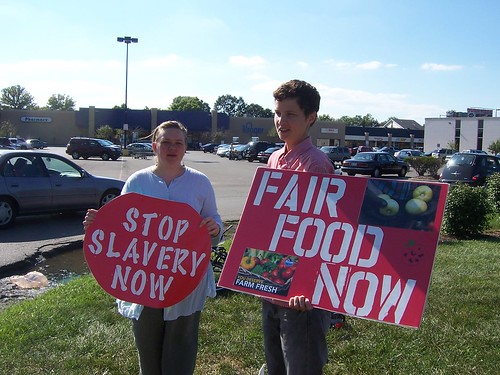
Wendy Ake (left) and Deb Steele outside the Kroger near the corner of Olentangy River and Ackerman Roads
Ake works with the recently formed Central Ohio Immigrant Justice (COIJ)
She expects more groups will get involved in the demos in front of various Kroger stores in Columbus.
"The Kroger headquarters is located in Westerville. So Columbus is probably going to be more and more of an active hub for this movement."
Ake said demos are planned for Kroger stores in urban areas as well as suburbs.
Increasingly, people in wealthy nations such as the US are interested in local and organic food. But she said labor and human rights issues often are not prominent in those movements.
"People are mainly engaged with health issues and maybe chemical inputs into their food but not so much with the labor and human rights issues involved with their food."
"Early on when the food movement started contemporaneous w/ the environmental movement back in the 70s, all of these issues were looked at. But when the FDA began to articulate its standards for the organic movement, it looked specifically at the chemical inputs ...and so the human rights issues and standards began to be marginalized."
She and other activists are working on changing that. She agreed people's hearts and minds can be engaged by way of their palates and stomachs, connecting a wide variety of social justice and environmental causes for a mass movement to defeat corporatism. She said human rights and environmentalism are inseparable.
"When we have global warming, for instance, the people most impacted are the most marginalized populations, globally and in our own backyards."
- Login to post comments
- Read more
- Download audio file
Former US Representative Mary Jo Kilroy on building a movement to defeat right-wing extremism
5:47 minutes (5.3 MB)
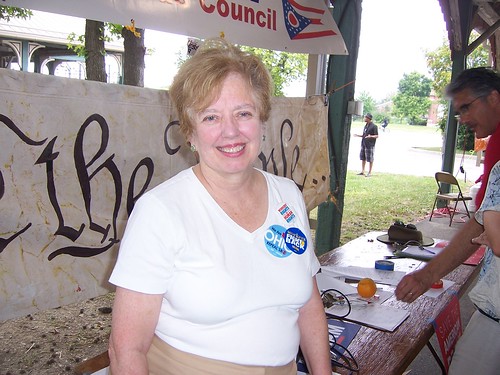
We spoke w/ Kilroy at the Stand Up For Ohio festival on Aug. 20
Here is what she had to say about building alliances to counter right wing extremism.
“We have to offer ideas to people that matter to them and their lives. The biggest thing we need to be talking about is how to improve the economy and bring jobs to our cities and to our towns and rural communities, jobs that allow people to have a middle class standard of living.”
Kilroy said she doesn’t want to talk w/ people about Sarah Palin or Michele Bachmann.
“I want to talk to people about where they’re at, what matters in their lives, not the lunacy that some of these right-wing, divisive figures peddle in this country.”
Kilroy acknowledged the risk of that sort of lunacy taking over our country if voters become desperate amid hard times. But she does not focus on those right-wing personalities when she engages w/ communities.
“ I don’t want to ignore them(people such as Bachmann), I just don’t want to talk to people about them all the time. I want to talk to people about what matters to them, so they see that there are other people, other ideas out there that are going to address their real needs so that those other crazy things…don’t have currency w/ them.”
Kilroy said if people are not side-tracked by hot-button issues such as evolution or global warming, they can take a stand for fairness for the vast majority of Americans.
“They don’t have to settle for politicians that are only concerned w/ 1 percent of the country.”
- Login to post comments
- Read more
- Download audio file

